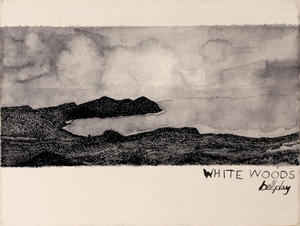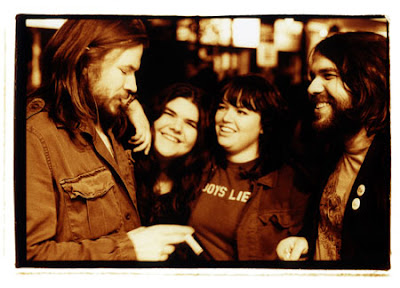ROMEO STODART, singer and songwriter with London’s THE MAGIC NUMBERS tells ANDY HAZEL about repressed accents, working with the late Robert Kirby and singing with great Brian Wilson.
It’s been a quiet spell for The Magic Numbers. Following their auspicious début onto the British scene five years ago which saw reviews glowing and concert-goers ecstatic, it was a mere 18 months between first and follow up album. Comprised of a double brother-sister combo; Romeo and Michele Stodart and Angel and Sean Gannon there has been a near four-year silence from the band since their previous album Those The Brokes. So, what went down?
“We finished touring, built a studio, did a lot of writing and my sister had a baby girl,” says singer and songwriter Romeo Stodart warmly. “I’m definitely excited to get out there to do shows. We’re playing some festivals here then we’re coming to Australia. We’re very keen to get back to the beach, I hope we get some days off,” he says wistfully, “I was born in Trinidad you see.” Does that explain the distinctive high-pitched voice? “Maybe,” he says laughing. “In Trinidad you speak patois with slang and if I’m stoned or angry I revert to the patois, actually, I almost feel like I’m repressing my accent day to day,” he says surprised.
The band’s third album The Runaway sees them branching out from the harmony-laden indie pop that made them the favourites of record store aficionados and the Beach Boys-loving dad throwing a dinner party, and into moodier territory. “Yeah, I guess The Runaway came out a bit like that, more moods than pop hooks,” he explains “There were more ways to colour the songs; more atmosphere in there. I wanted to make a guitar-driven record this time; less band-in-the-room and focus on using different instruments to move songs along. I think the album needs a few listens to unveil things.”
A key reason for this shift was the drafting in of Icelandic producer Valgeir Sigurðsson. “We’re all big fans of the Icelandic group múm. One of our favourite songs is We Have a Map of the Piano, and Valgeir did a lot on that. We were half way through recording and he was someone we’d talked about bringing in to provide an objective approach with fresh ears. He came over to London and listened to what we’d recorded so far and said: ‘yeah, when can I start?’” Stodart explains happily. “He’s got a really calming presence and ended up having quite a strong influence on the album. For instance, on Why Did You Call? we talked about making the drums different, not like a kit but not like a programmed drum sound either. Sean played the drums then Valgeir would go around the studio finding bits of paper, a box, a can, or anything that sounded good, and would layer those sounds to accompany the drum. What we like a lot is the subtleties of things, tiny things that make sounds you’re very used to hearing sound special, and he was great for that.”
Clearly a lot of other people like their subtle twists on indie folk-oriented pop given the impressive record sales, their six UK Top 40 singles and legions of loyal fans. Evidence of their songwriting quality is the litany of collaborators that their first album brought them. Bringing in Nick Drake’s one-time friend and arranger Robert Kirby for The Runaway turned out to provide Kirby with a worthy swansong before his untimely death last October.
“Robert Kirby had done all the string arrangements on the album so we tribute to him the end of [final song] I’m Sorry. His arrangements are just beautiful on their own,” he says, before a lengthy pause. “We got in touch while working on the second album, initially for the song Take Me or Leave Me. Michele sat there and played the song to him and he said: ‘Wow. Unusual time signature,” and she said ‘Really? I’m not sure what it is,” he says laughing. “We played him some others and Robert said ‘Look, this is right up my street, I’d love to work with you’. We just clicked on music and we became good friends for the last three years. So when we were working on the new album we got it sounding the way he wanted it. We were just really lucky to have made music together.”
Another recent collaboration that bore rich fruit was with Edwyn Collins, singer with Scottish outfit Orange Juice. “It was a really moving experience,” says Stodart contemplatively, tentative about the time spent working with Collins following his recent stroke. “Of course we were all big Orange Juice fans. We’d done a show with Edwyn before he had the stroke, kept in touch and played at his 50th birthday in Scotland, which was fantastic. When he was making the new album I got to go down to his studio; really, maybe nothing there was made after 1970,” he exclaims laughing. “They’ve got ProTools on a computer but it’s almost hidden, just in case someone needs to use it, everything is recorded live. I walked in and this guy shakes my hand and says ‘Hi. I’m playing drums with you today’ and it was Paul Cook from Sex Pistols! I couldn’t believe it,” Stodart says with youthful elation.
Hobnobbing with idols and critical hyperbole while nice don't explain the drive to create music or what keeps a fraternally-bonded band together as musicians. Stodart explains: “I do feel very lucky when I think of who we’ve worked with, and to have achieved half of what we’ve done as a band; playing big festivals, or small gigs where you see people down the front singing the songs. I can’t even describe it; it’s like ‘man…I never thought I’d be here’. The all-time maddest one was – I’m big into harmonies, as you can probably tell – when we supported Brian Wilson on tour in the UK,” Stodart says, his voice still redolent with disbelief. “We were touring with him and occasionally chatting to him after shows and for the last four nights of the tour he got us up to sing backing vocals on Love and Mercy, which is one of my favourite songs of his. To this day I look at this whole thing and that experience especially, as…not real.”
So, can there be any dreams left to fill? “In some ways I feel I can’t ask for more, but I still do have dreams. Neil Young, man…” Having a Neil Young ask to work with you maybe? “Well, yeah, but I’m cool just to rock up and bring my guitar and have a jam. I’d love that,” he says laughing. Don’t put it past him.












